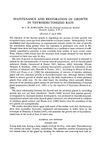 23 citations,
February 2021 in “Journal of Endocrinological Investigation”
23 citations,
February 2021 in “Journal of Endocrinological Investigation” Betacoronaviruses, like COVID-19, may cause hormone system dysfunction and affect disease susceptibility and severity.
 February 1960 in “Journal of the American Medical Association”
February 1960 in “Journal of the American Medical Association” Treatments for hair loss include estrogen therapy and special shampoos.
 9 citations,
August 1952 in “The Journal of Clinical Endocrinology & Metabolism”
9 citations,
August 1952 in “The Journal of Clinical Endocrinology & Metabolism” A 17-year-old female with adrenogenital syndrome produces very high levels of androgens, which prevent complete feminization despite high estrogen doses.
 1 citations,
September 2018 in “Australasian Journal of Dermatology”
1 citations,
September 2018 in “Australasian Journal of Dermatology” A boy with GAPO syndrome had hair loss similar to male pattern baldness without hormone issues, possibly due to skin or blood vessel problems.
 8 citations,
March 1942 in “Journal of Endocrinology”
8 citations,
March 1942 in “Journal of Endocrinology” Thyroid hormone treatments help thyroidectomized rats grow normally.
29 citations,
February 2011 in “PloS one” Astressin-B can reverse and prevent hair loss in stressed mice.
 131 citations,
August 2004 in “Best Practice & Research in Clinical Obstetrics & Gynaecology”
131 citations,
August 2004 in “Best Practice & Research in Clinical Obstetrics & Gynaecology” The conclusion is that PCOS is caused by ovarian sensitivity to hormones and disrupted hormone control, possibly due to ovarian factors, and more research is needed.
 20 citations,
June 2007 in “Recent Patents on Endocrine, Metabolic & Immune Drug Discovery”
20 citations,
June 2007 in “Recent Patents on Endocrine, Metabolic & Immune Drug Discovery” Certain inhibitors can potentially treat prostate cancer and other hormone-dependent conditions by controlling sex hormone levels in cells.
 69 citations,
November 2010 in “Middle East Fertility Society Journal”
69 citations,
November 2010 in “Middle East Fertility Society Journal” PCOS affects women's health by increasing the risk of diabetes, heart disease, and reproductive issues.
 November 2013 in “John Wiley & Sons, Ltd eBooks”
November 2013 in “John Wiley & Sons, Ltd eBooks” The document concludes that accurate diagnosis of male and female gonadal disorders is crucial for effective treatment and better patient outcomes.
 54 citations,
September 2013 in “Fertility and Sterility”
54 citations,
September 2013 in “Fertility and Sterility” Finasteride can reduce fertility in some men, but stopping it increases sperm count.
 6 citations,
September 2005 in “Expert Opinion on Pharmacotherapy”
6 citations,
September 2005 in “Expert Opinion on Pharmacotherapy” Androgen therapy can help with symptoms like low libido in women, but more research is needed to understand its long-term safety and effects on health.
 48 citations,
February 2013 in “Molecular and Cellular Endocrinology”
48 citations,
February 2013 in “Molecular and Cellular Endocrinology” The protein StAR is found in 17 different organs and can affect hair loss and brain functions, but its full role is not yet fully understood.
 January 2001 in “Cambridge University Press eBooks”
January 2001 in “Cambridge University Press eBooks” Early signs of PCOS in girls, like irregular periods and polycystic ovaries, suggest a need for early diagnosis and intervention to prevent further health issues.
 75 citations,
June 1999 in “Pediatric Clinics of North America”
75 citations,
June 1999 in “Pediatric Clinics of North America” The document concludes that early recognition and treatment of PCOS in adolescents is crucial for managing symptoms and long-term health risks.
 6 citations,
April 2018 in “Obstetrics, gynaecology and reproductive medicine”
6 citations,
April 2018 in “Obstetrics, gynaecology and reproductive medicine” Most women with hirsutism have it because of PCOS, and they need long-term treatment including medication and hair removal to improve their condition.
 8 citations,
January 1996 in “Gynecological Endocrinology”
8 citations,
January 1996 in “Gynecological Endocrinology” Cyproterone acetate is the preferred treatment for women's hyperandrogenism when estrogen/progestogen use is safe.
 29 citations,
December 2012 in “Current Opinion in Endocrinology, Diabetes and Obesity”
29 citations,
December 2012 in “Current Opinion in Endocrinology, Diabetes and Obesity” With careful management, people with congenital adrenal hyperplasia can have successful pregnancies and become parents.
 30 citations,
June 1988 in “Journal of Steroid Biochemistry”
30 citations,
June 1988 in “Journal of Steroid Biochemistry” Flutamide combined with an LHRH agonist effectively inhibits prostate growth, suggesting it could treat prostate cancer.
 14 citations,
November 1982 in “British Journal of Dermatology”
14 citations,
November 1982 in “British Journal of Dermatology” Testosterone conversion to 5α-DHT may not be essential for its effects on the skin.
 40 citations,
January 1994 in “Skin Pharmacology and Physiology”
40 citations,
January 1994 in “Skin Pharmacology and Physiology” Male hormones affect oil-producing skin cells differently based on their body location, and the drug spironolactone can reduce these effects.
 8 citations,
May 1982 in “Journal of Endocrinology/Journal of endocrinology”
8 citations,
May 1982 in “Journal of Endocrinology/Journal of endocrinology” Rat skin takes up and processes testosterone differently than other organs, with testosterone being more important for the skin than its metabolite 5α-DHT.
 2 citations,
February 2021 in “Endocrinology, diabetes & metabolism case reports”
2 citations,
February 2021 in “Endocrinology, diabetes & metabolism case reports” A teenage girl had both a rare ovarian tumor and a severe form of polycystic ovarian syndrome.
 January 2011 in “Journal of pediatric endocrinology & metabolism/Journal of pediatric endocrinology and metabolism”
January 2011 in “Journal of pediatric endocrinology & metabolism/Journal of pediatric endocrinology and metabolism” Hyperthyroidism can hide signs of high androgen levels in females.
 16 citations,
July 1996 in “Dermatologic Clinics”
16 citations,
July 1996 in “Dermatologic Clinics” Some psychiatric drugs can cause skin problems, but serious reactions are rare.
2 citations,
May 2023 in “Frontiers in Pharmacology” Natural products may help treat skin inflammation from abnormal adrenal hormones.
 11 citations,
December 2018 in “Assay and Drug Development Technologies”
11 citations,
December 2018 in “Assay and Drug Development Technologies” Natural herbal compounds might treat certain medical conditions by reducing DHT levels, but more research is needed to confirm their effectiveness and safety.
 January 2023 in “Endocrine Journal”
January 2023 in “Endocrine Journal” Treating classic 21-hydroxylase deficiency requires precise glucocorticoid dosing and attention to individual patient needs, with new treatments showing promise.
November 1993 in “PubMed” Hirsutism, excessive male-pattern hair in women, can be caused by high androgens or skin sensitivity, diagnosed by testosterone levels, and treated with hair removal and hormone therapy.
February 2024 in “Deleted Journal” Cabergoline effectively treated a dog's hyperadrenocorticism.

























